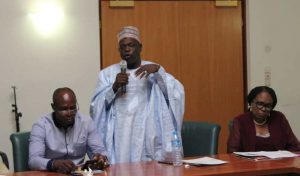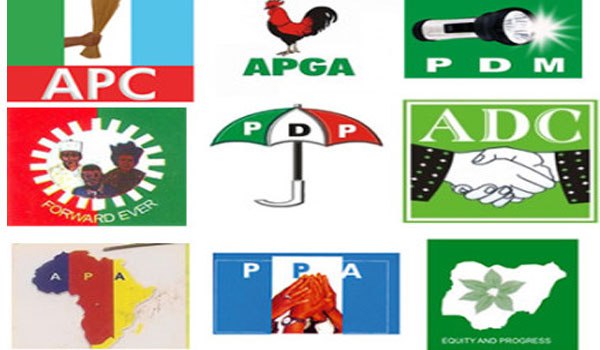It was an otherwise routine interactive session between leaders of Nigerian political parties and social influencers, (online newspaper editors, publishers, columnists, bloggers, etc). But it turned to be what the organisers would have loved were it carried live on national television if they had anticipated educated, informed, articulate and fearless party leaders that Nigerians would have loved to watch interrogating Nigeria itself as well as President Muhammad Buhari’s political personality while also pushing radical options for remaking Nigeria. Although the leaders of the two biggest political parties in Nigeria – the APC and the PDP – did not attend the interactive session, leaders of the parties in attendance were analytical, critical and brutally frank in discussing Nigeria. In fact, the discussions were so sustained that no one brought in religion, ethnicity or region. In summary, the speakers agreed that Nigeria has been a story of progressive decline since independence that it is now a second rate country even by African standards, to quote Kehinde Edun, the National Secretary of the Progressive People’s Alliance, (PPA).

Barrister Kehinde Edun, National Secretary of PPA speaking
Edun who was the second to speak at the session said Africans were looking up to Nigeria until they discovered that Nigeria is just a big for nothing giant. “Because of our behavior, we have brought this country on its knees”, said Edun who was speaking on the theme of how Nigeria might best mainstream anti-corruption and accountability, the theme of the interactive session organized by the Centre for Information Technology and Development, (CITAD) which is coordinating a MacArthur funded campaign on mainstreaming anti-corruption sensitivity in Nigeria.
Arguing that the wealth of the country is lying in people’s pockets and the vaults of banks in other countries, the speaker invoked a derisive social media graphic credited to Vladimir Putin of Russia that Africa is no more than a place where the leaders are buried at death. That is, the leaders do everything of theirs outside the continent except when they are dead, then they are brought to be buried at ‘home’.
He is, however, worried that the fate of the children of Nigeria would be worse than what exists now if the fight against corruption is not taken more seriously. Universities in Nigeria, he remarked, have been so run down that parents take their children to Ghana and other countries without feeling embarrassment. He came down heavily on political parties for the nomination fees they charge, saying it was another way of endorsing corruption since governorship form, for example, could sell for as high as N22 million when the governor’s monthly salary of about N500,000 could not add up to that amount even if he took no kobo from it for any other expenditure. Shifting to medical tourism, his analogy is that any president or governor Nigeria who goes outside the country for medical attention should be ashamed of itself.
He rounded off by calling for drastic actions against corruption on the ground that Nigeria could go under irretrievably if it continues the way it is going now. His caveat, however, is for all brilliant Nigerians to get into politics or risk extinction in the hands of those who have no qualms using money to get their ways as to annul the brilliance of those gifted.
He then yielded the ground to the next speaker, Muhammad Lawal Nalado, the National Chairman of Accord Party, (AP), who utilized the opportunity to, in a way, reply the first speaker, Barrister Akingbade Oyelekan of the Labour Party, who launched an attack on the anti-corruption war of the Buhari administration as well as the Buhari personality which he described as biased, insincere, directionless and counter-productive. Oyelekan, an eloquent speaker, said plea bargain is the dominant practice of retrieving loots across the world and wondered why the anti-corruption war in Nigeria abhors that. His claim is that the anti-corruption war in Nigeria is not fought in a manner that makes the nation the greatest beneficiary because, according to him, more money is being spent in fighting the war than what is coming in. He derided the practice of dramatic detention of a corruption suspect but only for the case to last several years thereafter. “We have allowed very smart people to manipulate the judiciary and so much money is being spent in prosecuting what is not there instead of plea bargain”, he told his audience.
Expatiating on the element of bias, he said as soon as a suspect crosses from the ‘wrong’ party to the ‘right’ party, his or her sins were forgiven, asking if that can be called fighting corruption. For him, anti-corruption rhetoric is being used to pursue enemies and this pursuit has, in his view, been taken too far. He was referring to the invasion of the houses of judges in 2016. On these grounds, he asserted his standpoint that the anti-corruption war lacks substance, focus and direction, saying that what political parties must do is to come clean on what they can achieve.

Alhaji Muhammad Nalado, National Chairman of Accord Party on his feet at the session
Alhaji Nalado’s key contention is that curbing corruption is a challenge for the people rather than the government or political leaders. The starting point in that, as far as he is concerned, is for Nigerians to insist on electing only those who have a history of having resisted corruption rather than those who have stolen the country blue. Not satisfied with that, he wants social media to expose those he said have stolen and want to come and lord it over the country.
His argument is that Nigeria has a leader today in President Muhammadu Buhari, saying that no other Nigerian has occupied sensitive offices in and outside the military without enriching himself as Buhari. He challenges others to score themselves using Buhari, asserting that God sent Buhari to teach Nigeria a lesson that it is not only people who have money that can get whatever they want. He meant that Buhari still became president even as he cannot be counted among the rich. So, he wants Nigerians to stop worshipping money and those who are powerful on account of their money. In apparent response to Oyelekan, Nalado said citizens should appreciate “those who have done well”but to call a spade a spade when it comes to those he said have stolen public resources. He is warning the country too that those who spent money to get elected would end up dictating to the party. In other words, Nalado spent much of his time in defense of President Buhari by replying Oyeekan who, however maintained his stand against Buhari when he had an opportunity to reply Nalado.
Oyelekan said there is nothing extra-ordinary about Buhari and that to emulate him amounted to putting something on nothing. “There is nothing to emulate about a president who doesn’t obey court orders, who doesn’t care about loss of troops”. He insisted Nigeria must change the narrative in favour of a president who understands the system, his own way of saying that President Buhari does not understand the Nigerian system.
The microphone moved to Comrade Mark Adebayo, the National Secretary of COWA Party who put eight suggestions on the table on dealing with corruption. Among these are enhance property tax regime; removing all anti-corruption institutions from the authority of the government in power; establishment of a special anti-corruption court to prevent the current situation where a corruption case can last several years and elimination of plea bargaining which he sees to be promotional of corruption.
He canvassed stopping Nigerians from attending universities and schools built by political leaders in the aftermath of their tenure just as he upbraided the society for aiding and abetting corruption by making such utterances as “ we know he is a thief but he is our own thief. So, leave him alone”. Agreeing with Oyelekan somehow, Comrade Adebayo asserted that Nigeria has never tried to tackle corruption if, by tackle, is meant a conclusive assault. “Anti-corruption war? Where is that war”, he asked rhetorically, proceeding to argue that Nigeria is at war with itself, a war being waged against the country by corrupt-preneurs – entrepreneurs of corruption, the same thing that is called Tenderpreneurs in the case of South Africa. His final remark was that CITAD had provided a platform which the parties and the social influencers should leverage on as far as fighting corruption in the country.
It had been a long day at Yar’Adua Centre where this took place Tuesday, November 27th, 2018. Although most described Nigeria as having descended from Olympian height at independence to virtual nothingness five decades after, no one doubted that remaking Nigeria is the way forward. What might be the most important requirement for that? Could it be neutrality/objectivity? This was the question media consultant, Diego Okenyodo, tried to unpack at the opening segment of the interactive section. The moderator, LASU Mass Communications scholar, Tunde Akanni made an instructive comment at the end of Okenyodo presentation: reporters are human beings and part of the same society. It seemed to be a consensus.




























